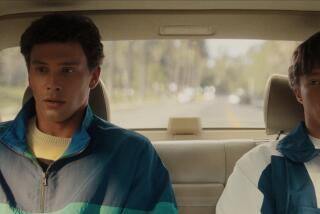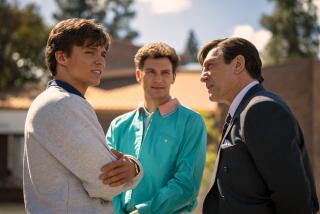Review: The tense, contemplative ‘Monsters and Men’ examines the aftermath of a police shooting
- Share via
The triptych of stories that unspool in “Monsters and Men,” a somber and strikingly assured debut feature written and directed by Reinaldo Marcus Green, are set in motion by an eternally, distressingly topical premise: the shooting of an unarmed black civilian by a white cop. The victim is Darius Larson, a.k.a. Big D (Samel Edwards), a resident of Brooklyn’s Bedford-Stuyvesant neighborhood, whose encounter with the police one evening swiftly escalates into an episode of pointless, nightmarish fatality.
An eyewitness video of the shooting eventually surfaces online, but Green pointedly doesn’t let us see it, as though reluctant to sensationalize his own narrative. Instead he shows how his three principal characters — three men whose paths almost but don’t quite cross — react to the video when they watch it in private, allowing us see the fear, indignation and heartache play out in their faces. He also acknowledges that his characters, by dint of their unique experience and perspective, will each see a different contour of the tragedy.
What those perspectives add up to is something both sobering and breathtaking. Unfolding in smoothly linear fashion, “Monsters and Men” is what you might call a pass-the-baton narrative, in which the dramatic focus shifts steadily from one character to the next. The result, while fragmented by design, is a politically astute, emotionally layered examination of a violent death and its lingering psychic residue. It’s about how the aftermath of a tragedy spirals outward into a community, sending tendrils of shock, anger and anxiety into the lives of even those hovering on the periphery.
The echoes of actual headlines are unmistakable and sometimes deliberate. Big D, a large man who sells cigarettes outside a corner deli, was inspired by Eric Garner, the Staten Island resident who died in 2014 after being placed in a chokehold by police. An off-screen plot point references that same year’s deadly shootings of two New York cops, while another narrative seems to anticipate, more abstractly, the highly visible activism of Colin Kaepernick. Casual, unremarkable micro-aggressions involving black men and white cops — license checks, incidents of stop-and-frisk — feel as germane to the scenery as the sun-dappled greenery and brownstone buildings.
But the power of the movie emerges less from any carefully engineered real-world parallels than from the rich dramatic life that spills into the frame around them. Green, a filmmaker of Puerto Rican and African American descent, brings a distinct quality of observation to a narrative that otherwise might have seemed airless and schematic. The director of photography, Patrick Scola, employs an active handheld camera that sometimes trails the characters from behind and sometimes frames them from afar, but always seems to be drawing them, with almost metaphysical force, toward moments of clarity and reckoning. “Monsters and Men” feels both meditative and always on the move.
The early scenes usher us into the cluttered, happy home life of Manny (Anthony Ramos), a young Latino with a wife (Jasmine Cephas Jones, Ramos’ “Hamilton” costar) and a young daughter, plus a new job in the lobby of a sleek Manhattan office building. Manny is hanging out with some friends in Bed-Stuy when he witnesses Big D’s confrontation with police, and it is he who films the subsequent shooting on his phone, an incident that seems to play out with both ghastly suddenness and slow-motion inevitability.
Unable to shake what he’s witnessed, especially after two cops later approach him and warn him not to get involved, Manny follows the angry pangs of conscience and posts the video online. (Whether the cops involved in the shooting were wearing body cameras is never explored.) The release of the footage ignites a wave of protests and carries some especially harsh consequences for Manny. But before we can learn what those consequences are, Green whisks us away to another thread, this one following Dennis (John David Washington), an African American cop who works in the same precinct.
Dennis, who has a wife (Nicole Beharie) and child of his own, emerges as the most compelling of the movie’s three protagonists, partly on the strength of a silently seething performance from Washington, even better here than in his higher-profile turn as a conflicted cop in Spike Lee’s “BlacKkKlansman.” As in that movie, Washington must investigate the tricky middle ground where the quandaries of being a black man and being a police officer converge. In addition to the daily stress of risking his life for his livelihood, Dennis is subject to the regular profiling of his colleagues — one of whom pulls him over in the movie’s terse, effective prologue — and also to the contempt of a black friend (Cassandra Freeman) who accuses him of siding with the enemy.
The third and youngest protagonist in “Monsters and Men” is a quiet, sensitive high-school student named Zyrick (Kelvin Harrison Jr.), who’s close to securing a college baseball scholarship. But while his father (Rob Morgan) urges him to stay focused and keep his eyes on the prize, Dennis can’t help but be distracted, first by the heightened police presence in his neighborhood and then by the emergence of the video of Big D’s shooting.
You could argue that there’s something a bit facile about Zyrick’s political awakening, one of a few moments in which the movie runs the risk of reducing its supporting characters to their talking points. But there is something irreducibly powerful about the three men that Green puts before us and the quiet helplessness, verging on emotional and moral paralysis, that grips each of them in turn.
For all that, “Monsters and Men” isn’t an overly dour or deterministic film, and it recognizes that silence, though often used to shield acts of cowardice and complicity, can also be a powerful and eloquent language of protest. The final shot is thrilling in the way it embraces optimism while rejecting sentimentality, and it fittingly ends with the camera still in motion, as though inviting the audience to complete the gesture. The movie passes the baton to us.
------------
‘Monsters and Men’
Rating: R, for language
Running time: 1 hour, 35 minutes
Playing: AMC Burbank 16, Burbank; ArcLight Cinemas, Hollywood; and the Landmark, West Los Angeles
Movie Trailers
More to Read
Only good movies
Get the Indie Focus newsletter, Mark Olsen's weekly guide to the world of cinema.
You may occasionally receive promotional content from the Los Angeles Times.










